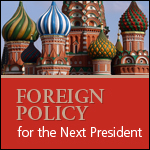The crisis in Georgia bluntly revealed the failure by the United States and Russia to create a closer working relationship after the Cold War. With both countries now in presidential transition, the potential for new misunderstandings and tensions grows even greater.
Established and well-understood treaties and agreements, which have previously inspired at least predictability and confidence in the bilateral relationship, could help establish a new book of rules both countries can embrace, explains Rose Gottemoeller in a new policy brief.
Recommendations for Russian and U.S. leaders:
- Prevent the START treaty—due to expire in December 2009—from being swept away in the aftermath of the Georgia crisis. Immediate completion of a new treaty is unlikely—though both countries recognize the need for one. Extending START for five years, but agreeing to negotiate and ratify a replacement within one, is a realistic option that should be pursued.
- The Conventional Armed Forces in Europe (CFE) treaty provides an opportunity for direct talks with all of the major players—NATO members, Russia, Georgia, and Ukraine. Confidence in Russia is deeply diminished following the Georgia crisis, but the treaty is a good way to begin slow and painful reengagement with the Russians towards a new system of security in Europe.
- Convene a commission of past presidents—U.S. and Russian—to resolve how to weave Russia and its security interests into the full fabric of European security.
Gottemoeller concludes:
“U.S.–Russia relations are in the grip of a deep crisis during the most unsettled of political seasons, when top leaders are in transition in both countries. Over the next six months, an agenda based on familiar issues and guided by eminent leaders is the best hope for avoiding a more serious clash. Now is the time to hold tightly to the superstructure of the U.S.–Russia past relationship, but only in order to have a stable foundation to think about the future. And that future must be approached in an entirely new way, drawing Russia into the system of European security as it has never been involved in the past.”
About the Author
Rose Gottemoeller is a specialist on defense and nuclear issues in Russia and the other former Soviet states whose research at the Endowment focuses on issues of nuclear security and stability, nonproliferation, and arms control. Before joining the Endowment in October 2000, Gottemoeller was deputy undersecretary for defense nuclear nonproliferation in the U.S. Department of Energy.
Rose Gottemoeller is a specialist on defense and nuclear issues in Russia and the other former Soviet states whose research at the Endowment focuses on issues of nuclear security and stability, nonproliferation, and arms control. Before joining the Endowment in October 2000, Gottemoeller was deputy undersecretary for defense nuclear nonproliferation in the U.S. Department of Energy.





